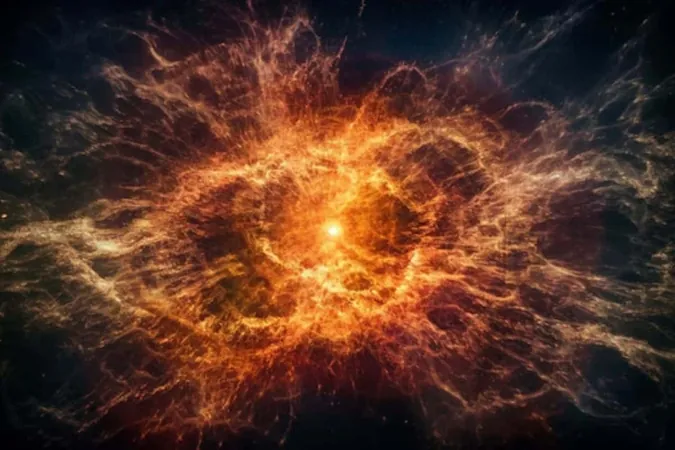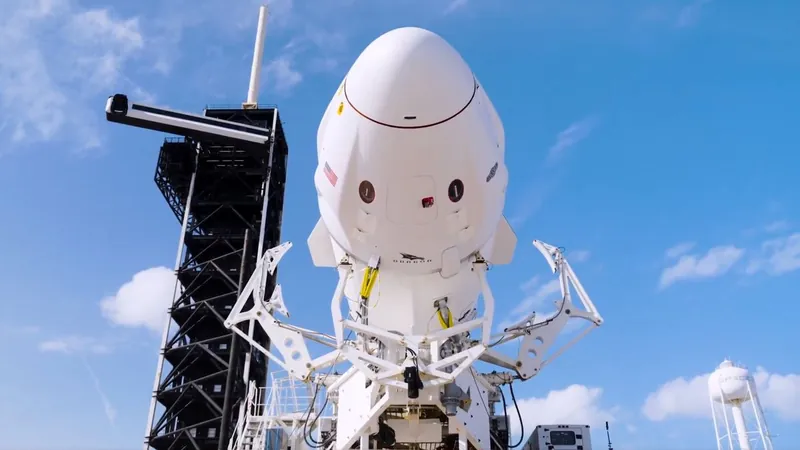
Shocking New Study: Water in the Universe Formed Just 100 Million Years After the Big Bang!
2025-03-29
Author: Ken Lee
How Did Water Come Into Being in the Cosmos?
In the universe's primordial stage, only the lightest elements—mainly hydrogen and helium, along with trace amounts of lithium—existed. How did oxygen, the key ingredient of water, emerge? The first stars, formed from gravitational clumps of hydrogen, played a vital role in this process. These massive stars engaged in nuclear fusion, creating heavier elements within their cores, including oxygen.
When these stars reached the end of their life cycles, they exploded in brilliant supernovae, spreading these heavier elements across the cosmos for the very first time. This allowed oxygen to bond with plentiful hydrogen, ultimately forming water molecules.
The Science Behind the Discovery
Published in *Nature Astronomy*, the study, led by astrophysicist Daniel Whalen from the University of Portsmouth, utilized sophisticated computer simulations to accurately recreate the sequences of events that led to water formation. The team focused on two categories of stars: those with masses equivalent to 13 times and up to 200 times that of the Sun.
Their striking findings revealed that supernova explosions unleashed massive vapor clouds filled with water. Interestingly, the smallest stars in their model generated enough water to equal Earth's mass, whereas the larger stars produced vapor clouds with masses akin to that of Jupiter!
Whalen emphasized, “To do anything less, you really just don’t know what’s happening," highlighting the necessity of simulating supernova events in realistic cosmic conditions.
Water's Surprising Early Arrival
The simulations suggest that water could have started forming merely 3 million years after a supernova, with this process taking as long as 90 million years. This deviation from traditional understanding implies that water may have existed just 100 million years after the Big Bang!
Remarkably, the research also revealed that gravity played a crucial role in causing this newly created water and heavier elements to clump together, which laid the groundwork for the birth of second-generation stars—and potentially the first planets!
A Shift in Cosmic Perspectives
These findings drastically alter our perception of the early universe. Evidence now points to the idea that water vapor may have been present long before the initial galaxies coalesced, suggesting that life's building blocks could have formed in conditions far more ancient and extreme than previously thought.
“This realization that water formed even before galaxies did shakes the very foundations of our beliefs about when life might have first appeared in the universe,” stated Whalen.
Team member Muhammad Latif from United Arab Emirates University revealed plans to further investigate if early water vapor could have survived the intense radiation during galaxy formation. They aim to discover whether these primordial molecules still exist today—perhaps even here on Earth!
As Avi Loeb of Harvard University remarked, "The chemistry of life as we know it requires liquid water, which is only found on planets or objects with a surface and atmosphere."
If this incredible hypothesis holds true, the existence of primordial water vapor may not only redefine the timeline of cosmic chemistry but could also revolutionize our understanding of the very origins of life itself. Are we on the brink of uncovering the secrets of how life began in the universe? Stay tuned as more revelations are likely just around the corner!


 Brasil (PT)
Brasil (PT)
 Canada (EN)
Canada (EN)
 Chile (ES)
Chile (ES)
 Česko (CS)
Česko (CS)
 대한민국 (KO)
대한민국 (KO)
 España (ES)
España (ES)
 France (FR)
France (FR)
 Hong Kong (EN)
Hong Kong (EN)
 Italia (IT)
Italia (IT)
 日本 (JA)
日本 (JA)
 Magyarország (HU)
Magyarország (HU)
 Norge (NO)
Norge (NO)
 Polska (PL)
Polska (PL)
 Schweiz (DE)
Schweiz (DE)
 Singapore (EN)
Singapore (EN)
 Sverige (SV)
Sverige (SV)
 Suomi (FI)
Suomi (FI)
 Türkiye (TR)
Türkiye (TR)
 الإمارات العربية المتحدة (AR)
الإمارات العربية المتحدة (AR)